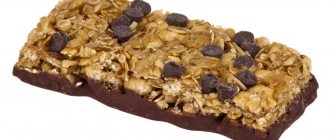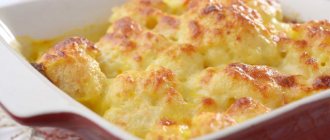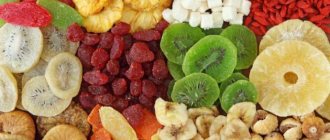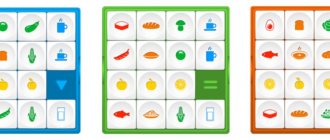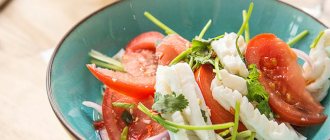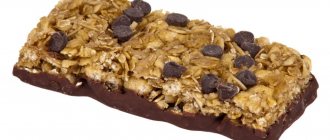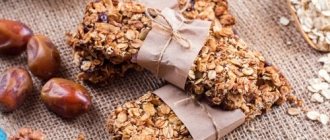The fashion for a healthy lifestyle has contributed to the appearance on the market of many products claiming to be healthy. These include diet muesli bars. According to the manufacturers, they are made entirely from natural, healthy ingredients, have low calorie content and help you lose weight.
But before you buy fitness bars, you need to find out what beneficial and harmful properties they have, and whether they are really suitable for your diet. Athletes can take note of several recipes for products that can be prepared at home.
The benefits and harms of fitness bars for weight loss
There is a large assortment of sweets marked “Fitness”, “Health” or “Diet”. According to the manufacturers, they are rich in whole grains, dried fruits, nuts, seeds, berries, protein and other components. These sweets have the following beneficial properties:
- Contains grains: barley, oatmeal, wheat, rice, etc. These components are rich in fiber, which cleanses the digestive tract of toxins and waste, and makes the intestines work more actively. They are suitable for snacking because the rough dietary fiber swells inside the stomach, causing a feeling of fullness without spikes in blood sugar.
- They have high nutritional value, a breakfast bar will quickly and permanently relieve hunger, energize, and stimulate brain function. There is no need to waste time preparing food.
- They have a natural, balanced composition. Healthy sweets are rich in vitamins, minerals, amino acids, which are necessary for normal life. Saturate the body with B vitamins, calcium, magnesium, fatty acids, etc.
- The grains in the composition normalize metabolism (including carbohydrates). Coarse dietary fiber helps break down fats and reduce cholesterol levels in blood vessels.
Diet bars allow you to restore strength after an active workout or hard physical work. They are suitable for a snack, and can also replace a full meal. In addition, fitness bars are tasty, healthy and convenient.
Including them in your diet is an effective way to avoid dieting breakdowns. Healthy sweets are an excellent substitute for unhealthy confectionery products that spoil your figure and contribute to an increase in body fat.
Fitness bars have the following disadvantages:
- high calorie content - about 550 kcal/100 g. This is due to an excess of sugar, other sweeteners, fatty components and flour in the composition;
Attention! Nutritionists say that it is enough to eat 30 g of a muesli bar per day to replenish energy reserves, satisfy hunger and saturate cells with useful substances. You should drink it with unsweetened tea or water.
- large amounts of sugar or sweeteners (sucrose, fructose). Simple carbohydrates lead to increased glucose levels, metabolic disorders, and digestive problems. Such desserts are contraindicated for diabetics;
- palm oil is practically not processed by the body, settles on the walls of blood vessels, in the liver, slows down metabolic processes, contributes to an increase in body fat and the development of diseases of the cardiovascular system;
- A large amount of fat is found in nuts, seeds, vegetable oil or butter. These components increase the calorie content of the product and additionally load the liver;
- Most bars are rich in flavors, flavor enhancers, dyes, and preservatives. These chemical additives disrupt the functioning of the liver and kidneys and can cause allergies.
Also, the bars may contain low-quality condensed milk, molasses (maltodextrin), and wheat flour. These components increase calorie content, disrupt digestion, promote weight gain, and can cause allergies.
Be sure to check out: Diet cabbage salad: the best recipes Safe cleansing: flax seeds for weight loss Kefir on a diet: are alternatives possible Proper castling: how to replace high-calorie treats and allergenic foods on a diet
Are they really dietary and low calorie?
Sports bars differ depending on the composition:
- Cereals – made from pressed cereals with honey, nuts and seeds, etc. Ideally, they contain a lot of complex carbohydrates and a minimum of fat. They speed up metabolic processes, quickly fill you up, and satisfy your hunger after a fat-burning workout.
- Protein - contain 40% protein. Used for muscle growth throughout the day or after training (including on a low-carb diet).
- Protein bars with carbohydrates (1:3 or 1:4) contain from 400 kcal in 1 snack. Especially useful after intense exercise and hard physical work.
- With L-carnitine – contains the fat burner of the same name, which creates conditions for weight loss. The low-calorie bar can be eaten before and after exercise.
- Oatmeal – this option is suitable for weight loss, as it contains a minimum of carbohydrates and healthy ingredients. The product is suitable for use before/after training, morning or evening.
To understand whether you bought low-calorie bars or not, you need to study the composition. If sugar, fats, and chemical additives are in the first positions, then they are completely unsuitable for weight loss.
A chocolate bar that contains a lot of protein, complex carbohydrates, a minimum of fat and simple carbohydrates is considered dietary. Allowable calorie content – up to 200 kcal/100 g.
If the composition of the bar meets dietary standards, then you can include it in the menu. The main thing is to use it in moderation. It is correct to replace unhealthy sweets with them during tea drinking, use them as a snack or replace a meal. If a person eats more than 2 of them daily, then weight will increase due to excess calories and carbohydrate levels in the body. For example, athletes during mass-building training can consume protein bars, reducing the amount of carbohydrates in the diet.
Important! None of the groups of bars directly affects weight loss. Weight will decrease when the body expends more energy than it receives from food.
Types of fitness bars
There is a huge range of candy bars on the market – you can easily get confused by the number of names and manufacturers. In general, they can be divided into several categories, which have slightly different composition and characteristics.
Cereal bars are widely known. They are sold in almost every supermarket and usually contain pressed cereals with honey, nuts and seeds, small pieces of dried fruits and berries, and sometimes with the addition of chocolate or jam. This is a natural organic product, affordable and tasty. Such bars can replace a high-calorie snack or be used as a substitute for high-calorie sweets when drinking tea. When purchasing such products, be sure to pay attention to the composition - it is better for your figure if it contains honey or a sweetener rather than sugar. These granola bars are made primarily of complex carbohydrates, making them instantly filling.
Protein bars can usually be purchased at specialty sports nutrition stores or pharmacies. The basis of their composition is protein. These protein bars are created for those who monitor their muscle mass and try to increase it.
Energy bars contain the optimal combination of carbohydrates and protein to provide energy and satiety. This is a great safe snack option, especially for those who are used to doing cardio and outdoor activities.
Which protein bars are better: factory-made or homemade?
High-quality fitness bars have a balanced composition, they charge you with energy, speed up your metabolism, and relieve hunger for a long time. If you choose the right store product, it will only bring benefits. To have a snack and replenish your energy, all you need to do is buy a healthy chocolate bar and eat it with pleasure, rather than wasting time on cooking.
However, it often happens that factory products contain excess sugar, fats, simple carbohydrates, and chemical additives. This invariably leads to disruption of metabolic processes, digestive disorders, increased body fat, and allergies.
If desired, the diet bar can be made at home. Then the composition will depend entirely on you. Sugar can be replaced with honey or natural sweeteners such as stevia. There will be no dyes, preservatives, flavors, flavor enhancers, or palm oil in the recipe. The composition can be replenished with useful substances, and the amount of fat can be reduced.
As you can see, it is safer to make your own protein bars. However, in a store-bought product, the proportions of dietary supplements, vitamins and minerals are correct. But if desired, their quantity can be calculated together with a nutritionist.
Experts' opinions
Nutrition experts say that not all diet bars are healthy and can be included in the diet when losing weight. To choose a good product, you need to study the composition, pay attention to the proportions of BZHU, calorie content. If sugar or sugar-based syrups, fats (palm oil, butter), chemical additives, and milk chocolate are in the first positions, then you should avoid such food.
A healthy dietary bar should contain whole grains, dried fruits, berries, nuts, seeds, and high-quality protein. Such products nourish, charge, serve as material for the construction of new cells, improve metabolic processes, digestion, cleanse, and promote weight loss.
You can make delicious and healthy candies yourself. A nutritionist will help you calculate the proportions of BJU and calorie content in order to get the ideal product for a particular person.
Margarita Koroleva, nutritionist
A well-known nutritionist advises to always read the ingredients when choosing diet bars. According to M. Koroleva, you need to buy products with whole grain flakes, freeze-dried pieces of fruit, flax seeds, and chia. The amount of almonds, dried apricots, walnuts, prunes, and dates should be small. The fact is that nuts and dried fruits are quite high in calories.
The list of not the most healthy ingredients looks like this: sugar, fructose, palm oil, lecithin, emulsifier E476, molasses, etc.
Elena Kalen, nutritionist
An expert in the psychology of weight loss and a certified coach says that store-bought bars contain many harmful additives that cause more harm. They always contain simple carbohydrates, which cause spikes in blood glucose levels, causing an immediate rise in energy, and then a sharp decline.
The nutritionist advises avoiding store-bought bars with flavorings, sweeteners, large amounts of chocolate coating, hydrolyzed gelatin, corn syrup, and palm oil.
E. Kalen argues that a high-quality diet bar cannot be cheap. She also advised preparing healthy sweets at home using a nutritionist’s recipe.
Liz Applegate, sports nutritionist
A California expert speaks out against store-bought granola bars for weight loss. She claims that they contain an excess of sugar, fats, and simple carbohydrates. In terms of the amount of these ingredients, the bars are comparable to candy, so when losing weight it is better to give them up or consume them in minimal quantities. In addition, the level of simple carbohydrates indicated on the wrapper is often exceeded.
Composition, calorie content and BZHU
Let's take a closer look at the composition and calorie content of fitness bars to have an accurate idea of how beneficial they can be.
The most common ingredient in bars is cereals, that is, whole grains (barley, wheat, rolled oats, rice, etc.). They form a very healthy basis, contain a large amount of fiber necessary for intestinal function, and the presence of carbohydrates in the composition allows you to feel full even after a small portion.
Also, such bars can contain a large number of different additives that affect the taste and beneficial properties. It can be nuts, chopped fruits, seeds, honey. All these ingredients are useful if you do not abuse them in large portions.
You should always pay attention to the composition: some manufacturers use terms such as “fitness”, “diet” and the like in packaging design only as an advertising ploy - it is better to refuse cereal bars if you see sugar or a large number of artificial additives in the composition and dyes, fructose or starch. The same applies to bars coated with chocolate or containing caramel. Such a product will not cause any harm to health, but for weight loss they will be completely useless.
The average calorie content of cereal bars is approximately 350 kcal per 100 g. This is a fairly large figure, but we must not forget that with one snack, an average of 1-2 of these bars weighing no more than 50 g are eaten, and they charge you with energy for a long time.
There are also low-calorie bars made from the so-called “sports chocolate” - they contain about 200-250 kcal per 100 g. They contain a large amount of protein for muscle mass.
Protein bars will have the least calories - usually from 160 to 200 kcal per 100 grams.
The ratio of BJU in cereal-based bars (per 100 g):
- proteins – 11.3 g;
- fats – 17 g;
- carbohydrates – 31 g.
This ratio can be called approximate: it depends on the composition. For example, a nut-free bar will have less fat.
Protein bars have a completely different ratio because they are designed to provide the body with a large amount of protein.
- proteins – 20 g;
- fats – 6.5 g;
- carbohydrates – 6.4 g.
In some bars, the protein content can reach 45 g, and the amount of carbohydrates is reduced.
Main conclusions
As you can see, not all diet bars are suitable for weight loss. When choosing and consuming healthy treats, you need to follow these recommendations:
- Study the ingredients before purchasing a store-bought diet bar. Avoid products with a lot of sugar, fats, and chemical additives.
- Choose a diet bar with whole grains, honey, dried fruits, quality protein, a small amount of nuts and seeds.
- Give preference to a product that contains more proteins, complex carbohydrates, low fat and simple carbohydrates.
- Use diet bars instead of a snack or replace them with a full meal.
- Consume no more than 30-50 g of product per day.
- If you have free time, prepare your own nutrition bars. A personal nutritionist will tell you the proportions of BJU and calorie content separately for each client.
If you follow these recommendations, diet bars will help you steadily and safely lose weight and saturate your body with useful substances.
If you have your own proven recipes for healthy sweets that have helped you get rid of extra pounds, then share them in the comments.
Can I use it while on a diet?
There are different opinions about how beneficial it is to consume energy fitness bars when following a diet for losing weight; we will try to give this the most reasonable assessment, taking into account various factors.
The main factor in eating bars while dieting is moderation.
Replacing regular sweets with tea or using them as a snack or meal is a good idea.
If you eat them regularly and in large quantities, then the desired result is unlikely to be achieved due to a serious excess of calories and a large amount of carbohydrates entering the body.
If your diet is aimed at building muscle mass, then it is better to switch to protein bars while limiting your carbohydrate intake. Consult a trainer to find out what amount of carbohydrates per day is acceptable for you.
